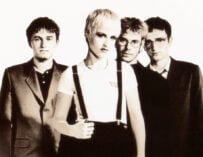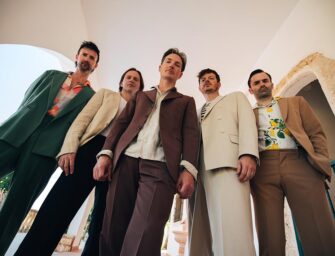
Dolores O’Riordan: “Linger came around that ‘fatal love’ kind of stage in my life, when it was all drama.”
The Irish rock band’s frontwoman speaks candidly about coping with bi-polar disorder and how they wrote their first hit ‘Linger’
Led by a feisty, yodelling frontwoman, Dolores O’Riordan, the Irish alternative rock band The Cranberries found worldwide commercial success in the 90s with their debut album, Everybody Else Is Doing It, So Why Can’t We?, which featured the single Linger. The follow-up No Need To Argue, could easily have been their ‘difficult second album’, but it actually became their best-selling LP, propelled by its lead single Zombie, which topped the charts in five countries.
After an extraordinary career across the past two decades – selling nearly 50 million albums – Dolores, guitarist Noel Hogan, bassist Mike Hogan and drummer Fergal Lawler returned in 2017 with Something Else, an album of new material and their greatest hits reimagined with a string quartet. While she hung out with her partner in New York earlier this year, Dolores told us more about her story and her struggle with bi-polar disorder, writer’s block and insomnia-induced late night songwriting…
Click here for more interviews
“We had a piano at home in my parents’ house, so I had been writing songs since I was 12 years old. But I wanted a band with bass, guitar and drums. There was a girl in my flat who was going out with a guy who used to sing with The Cranberries and at the time they were called The Cranberry Sauce. She told me they were looking for a singer and that maybe I should go and meet them. On Sundays they used to rehearse at the local studio, so I went there and met Mike, Ferg and Noel. I remember there were a lot of guys there, probably about 10 of them in the room, just hanging out, and they were about 16, 17 or 18 years old. I was 18 and went in with my Yamaha keyboard under my arm, sang a few songs for them and then they played a few songs for me. I remember thinking they had potential and one of the things they played was Linger – I really liked that one and took home a cassette recording of Noel playing the four chords. Then that week I was busy working on it in my bedroom, trying to work out my parts and what I was going to sing. You know when you’re a teenager, you’re dating and you get a broken heart and it’s just so fatal? Well, Linger came around that ‘fatal love’ kind of stage in my life, when it was all drama.”
How did the band develop from there?
“Well, we used to rehearse in this small little room and we didn’t have any PA or anything – Noel had an amp and Mike had an amp which I plugged my microphone into. It was very hard to hear what I was singing because his guitar was going through the same amp. A few months later we made our first demo with Linger and a song I believe was called Sunday, and Dreams, and I think there was a song called Nothing Left At All.

Dolores with The Cranberries: “It’s important not to worry too much about what people think, because then you’d never write.”
“Noel sent the demo to a bunch of UK record companies and a little buzz began to occur in the music industry over there. There was a company called Imago with a guy called Terry Ellis, who was interested. Also Island Records and, I believe, Rough Trade were interested, because Geoff Travis ended up managing us for a long period of time. To make a long story short, we ended up going with Island.
“We were doing a gig in Limerick and we had very little live performance experience. We’d only done five or six gigs before, at the time, so I didn’t have a clue how to perform – I was just a bag of nerves. I recall a band called 808 State were playing there that night too. For that show, there was a bunch of these record company people flying into Shannon and I remember coming off-stage and meeting Denny Cordell [from Island Records] who eventually went on to sign us. I had no idea what that even meant!”
You started off working with the legendary producer Stephen Street. How did that work out?
“We thought of Stephen because we were all die-hard Smiths fans, so we got him and he produced the first two albums.”
What was the point when you knew something special was happening?
“Maybe six months to a year later, when we were doing our first European tour. Because up until then we’d only done small, local gigs in Ireland. So we went out to mainland Europe and got the opening slot for the Hothouse Flowers. Their capacities would’ve been around 3000 to 6000 seaters, so that was good experience because we were actually on a tour bus. But I recall we were asked to go to America and we didn’t finish that tour because we were told Linger had gone Top 10 over there. So we flew into Los Angeles and made a video there, and I remember we were on heavy rotation on MTV – I think they played Linger about 12 times-a-day or something like that. It blew up then.”
What advice would you give to budding songwriters and lyricists?
“I suppose it’s important not to worry too much about what people think, because then you’d never write. I do get periods of writer’s block and that can be so annoying when you go through six months of having problems just writing.”
Do you prefer to write alone or with other musicians?
“I like to write in solitude and I like working with Noel because it’s always a challenge to come up with something for what he’s written. Sometimes I’ll tell him to go into a different chord or manipulate what he already had and tweak it a bit.”

Dolores O’Riordan with The Cranberries: “I could be walking up the road, humming into my phone like a mad woman!”
Typically, where do you normally look for inspiration?
“I go from a lot of different life experiences: births, deaths, war, pain, depression, anger, sadness… emotions, y’know. Nostalgia is a big one for me, but then I’m also obsessed with mortality. I wake up in the morning and I’m feeling anguish, I feel terrible and I don’t know why. I wake up and look out and think, ‘Oh God, how do I get through another day!?’ I get so worried, and I have a couple of cups of coffee and I start to feel okay, but life can be difficult.”
So do you use songwriting as catharsis to make sense of that?
“Yeah, I’ve always struggled with mood-swings. I have bi-polar disorder and so I think I go from being extremely high to being really low – one extreme to the next. But I honestly think a lot of writers have trouble that way, especially as life progresses. I find life really difficult, so I have to keep busy all the time, otherwise I go crazy – I suppose that’s why writing is great.”
Do you like to write in the morning when you’re in that low state, or do you wait until the fog lifts and you start feeling more optimistic?
“Well, I tend to write straight through all the time, but I think that’s why some of my material can be very bright and poppy, and some can be very dark. Like Rupture is a dark song, but I go to deep, dark places and then I can be elated and it can all happen in one day.”
Do you think your disposition makes you better songwriter, in some ways?
“I think it plays a part in it, definitely, with the mood swings I get.”
You mentioned earlier about playing the keyboard and then the guitar. When you’re writing, do you switch between those instruments?
“Yeah, I can switch over from one to the other. I have a nice keyboard here that has a lot of great sounds and effects on it. Sometimes I can be lying in bed, trying to get to sleep, and a melody will come into my head, so I get out of bed and I start playing it. Then I go downstairs, and my partner has a studio so I’ll ask him, ‘I’ve got an idea, can we get it down?’ Although it’s two-thirty in the morning, that’s when I get my ideas. It’s weird isn’t it? It’s very often at bedtime, that these ideas will come out of nowhere. I’ve often had that, when I’m almost dreaming a song.”
How do you capture those ideas?
“I very often use my phone to put down an idea, if I don’t have access to anything else. I could be walking up the road, humming into my phone like a mad woman!”
With the new album, what is it like revisiting the old hits after all this time?
“With the strings, it gives them a freshness. It’s funny because I’ve sung Linger so many times, but now I might go, ‘What verse is coming up next?’ because you’re singing the same song and it feels like you’re going round in circles.”
Interview: Aaron Slater
Something Else, The Cranberries’ new album of acoustic versions of their classic hits and three new songs, all featuring a string quartet from the Irish Chamber Orchestra, is out now. For more info, go to: cranberries.com


































Related Articles